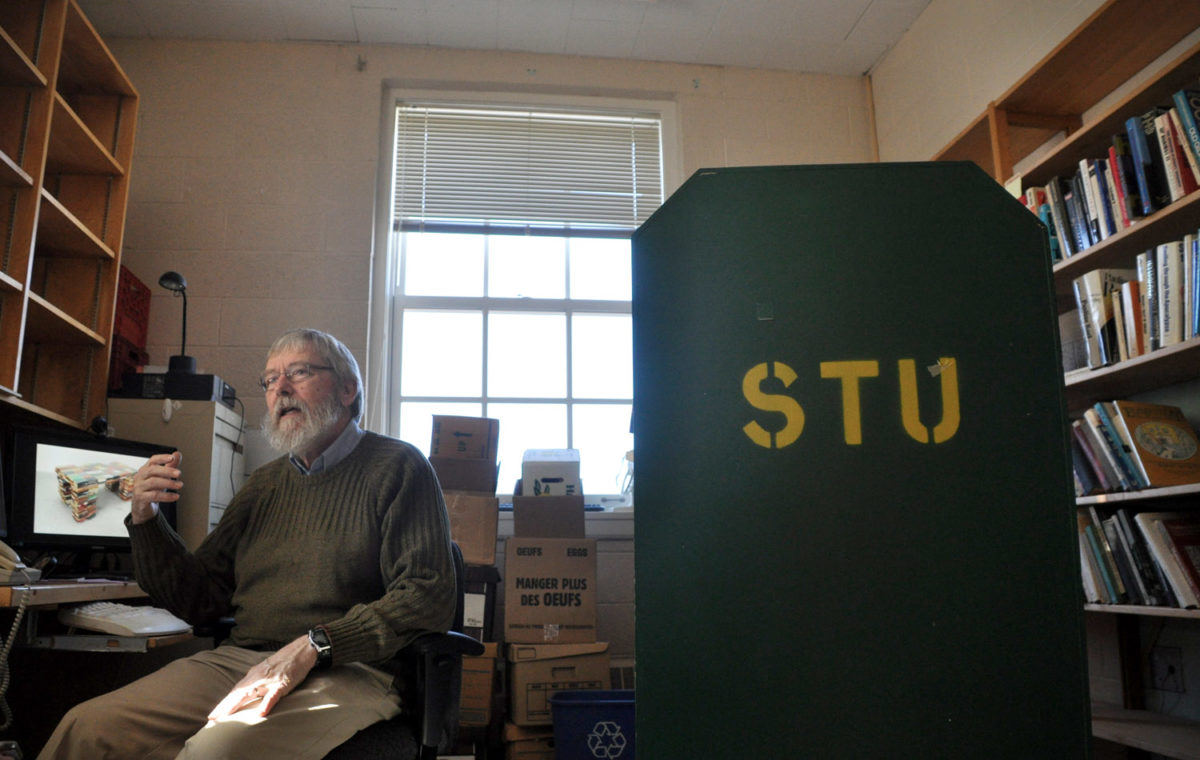
The year was 1968, the Vietnam War was on, and students were revolting on campuses like Roosevelt University in Chicago. This is where English professor Russ Hunt started his career.
He spent many hours on buses with young people arrested for demonstrating. To his students, Hunt served as a protector against police brutality. It didn’t take long in this hostile environment before the young teacher started applying for jobs at Canadian universities.
“The week before I actually moved, I had taken my wife and two kids to the bus station and there had just been a riot in the Loop and we walked through tear gas,” said Hunt. “That was kind of my farewell to the U.S.”
Hunt has been at St. Thomas ever since. Now, almost 50 years later he’s packing up his Edmund Casey office and officially retiring.
•••
Sun streams in through the large wood-trimmed windows, and bookshelves line the walls. The professor, with his bulky sweater and grey hair, muses over emails as students and faculty silently saunter into Hunt’s work den. Some leave with one book while others leave with armfuls.
Hunt has opened his office of the last 20 years into an adoption centre for orphan books. His once scattered collection now stands organized by post-it notes. Each yellow sticky has a category scrawled across it—fiction, journalism, 18th century and a few others.
“I just saw some people take a stack of books and I know that they wanted those books and that’s a good feeling. Someone was in here this morning who had been looking at the books and had said that ‘this is like a dream come true’,” said Hunt.
When the idea first came to Hunt, he thought his old collection would only be of use to the library. When the HIL only took a small chunk, he invited the English department to take a look. Then the idea that students might be interested occurred to him. His books became a free for all.
“I’ve gotten rid of a few hundred. Before, all the shelves were filled and so was on top of the shelves. Some were even double shelved; there were books behind books.”
When Hunt realized he was going to have to start emptying out his office, he’d pick up a book and ask himself he would ever use the text again. The answer was ‘yes’ to almost every one.
“I realized I wasn’t going to get rid of any that way. So, I wasn’t going to make that decision. If somebody wants the book I will be really happy to have somebody have a book that I really like.”
The professor only kept a few books that held sentimental value.
“As a book lover I could never understand how you can give away all of your books. I feel it must be hard to let go of something that surrounded you for so long. Even though most books weren’t storybooks, but educational, you still had an experience with them like new ideas or new thoughts,” said Nadja Schlote, a student who perused Hunt’s stacks. “Nevertheless, I think it is great that he gave them to the campus community first. That way they get a second life.”
•••
Hunt says the books are not something he’ll miss. What he’ll miss the most is his office and colleagues.
“Most years I’ve been teaching with two other people in the Aquinas program and with the same students… planning out the class and working together and actually being in the classroom together. That’s fun and I’ll miss that,” said Hunt.
At 73, Hunt has no desire to stop teaching. Eight years ago, he was one of the last professors forced into a mandatory retirement at the age of 65.
“During that time, there was a post-retirement contract, if the department wanted you and the president accepted their recommendation, you could continue to teach full time at half the salary, which was plenty for me,” said Hunt.
The post-retirement position no longer exists. In 2010, the courts determined that mandatory retirement was a violation of the Charter of Rights and Freedoms – too late for the English professor. Hunt’s last limited contract ends in June and the administration has not renewed the contract.
“There remains a strong current of opinion that older faculty who have had a long career ‘ought to’ retire to give a position to a younger graduate. The alternative principle is that people age at very different rates. Older people who remain competent in their careers ought not to be discriminated against,” said sociology professor Sylvia Hale.
Hunt might be leaving St. Thomas, but that doesn’t mean he’s going to quit working. The retiree plans to finish writing a book about teaching, along with other side projects.
“I think if you’re ready then big changes in your life is a good thing to do.”
